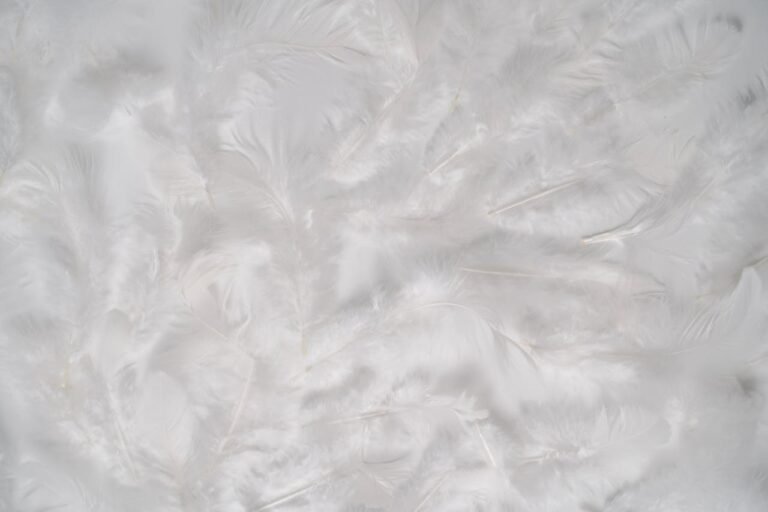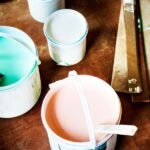Eco-Friendly Innovations in the Beauty and Personal Care Industry
The sustainability trend has gained traction in various industries as consumers have become more eco-conscious, and the ever-evolving beauty industry is expected to become more natural than ever.
In response to the demand for sustainable cosmetic products, companies are aligning with the green trend by shifting towards implementing eco-friendly ingredients and innovative formulations that meet the expectations of the new market.
Fast fashion is a prevalent issue in the fashion industry, and a similar trend is emerging in the cosmetic industry. Today’s consumers are more aware and concerned about environmental issues related to cosmetic ingredients. Substandard cosmetic products containing ingredients that may negatively impact the environment are also a concern.1
Eco-conscious consumers are increasingly aware of the ill effects of cosmetic products not made with natural ingredients, and the impact on the environment, particularly on the aquatic fauna and flora.2
AS cosmetic brands incorporated sustainable practices recently, their strategies focus on attracting eco-minded consumers who prioritise both their health as well as the well-being of the environment.
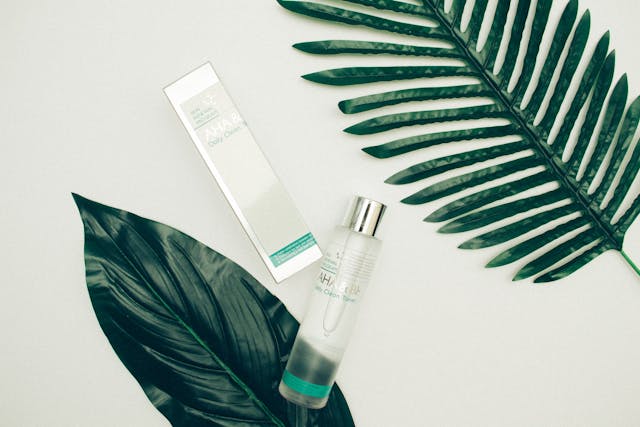
In This Article
- A Sustainable Beauty Industry: An Overview
- Why is Sustainable Beauty Important?
- Eco-Friendly Innovations in the Beauty and Personal Care Industry
- Sustainable Packaging and Ingredients in Beauty Products
- Zero-Waste Personal Care Routines
- Frequently Asked Questions
- Conclusion
- Sources
A Sustainable Beauty Industry: An Overview
The beauty industry has grown significantly to become a huge industry, influencing and exciting more consumers than ever with new products. The international market demand for trendy and sustainable goods and services is driving the growth of the cosmetic industry, as it is consistently ever-evolving and has been on a rapid growth trajectory for years and is estimated to reach over $730 billion by 2028.3,4
The industry has a huge influence and economic impact on a global scale. Skincare, make-up, perfume, hair care, deodorants, oral cosmetics, and toiletries are key product categories within the cosmetic market that meet consumer demand for personal care.
The cosmetic industry has made significant changes since the start of the sustainability trend, prioritising innovative technologies and practices to protect the environment throughout product lifecycles—from sourcing sustainable raw materials to manufacturing and disposal.
Most consumers now prefer sustainable cosmetic products that do not impact the environment. The growing sustainability trends mean the majority of consumers will only patronise brands promoting environmental sustainability. Due to the growing concern about waste generation, products made sustainably and packaged with recyclable and biodegradable materials will be widely favoured by consumers.
Why is Sustainable Beauty Important?
The concept of Sustainable Beauty is focused on making significant changes to minimise the industry’s carbon footprint and achieve sustainability in the industry.
The beauty industry remains one of the largest polluters, generating substantial waste that adversely impacts the environment. It’s estimated that the cosmetic industry generates about 120 billion units of packaging per year. That is quite a lot, and most of this packaging will litter the environment, particularly in landfills or, even worse, the ocean.
According to research, cosmetics contain various harmful chemicals that affect the environment and human health. The classification of cosmetic ingredients falls into three different categories: functional ingredients, aesthetic modifiers and claim ingredients. Most cosmetics contain a combination of these three types.5
Extracting and utilising cosmetic ingredients such as parabens, palm oil, lead, microplastics, and silicones can lead to serious environmental issues such as deforestation, air pollution, and depletion of coral reefs.4
The beauty industry can adopt green practices, implementing sustainability in production to avoid environmental degradation. Sustainability in the beauty industry can be achieved through innovative strategies.
Eco-Friendly Innovations in the Beauty and Personal Care Industry
1. Natural or Organic Ingredient
Utilising natural ingredients in cosmetic products aligns with the new sustainability trend. Consumers are concerned and aware of the environmental implications of synthetic additives in cosmetics.
Sustainability in the industry starts by using ingredients ethically sourced and cruelty-free.
- Aloe Vera: A natural ingredient widely utilised in natural skin care products. Sustainably sourced, aloe is the ideal ingredient for consumers with sensitive skin. Aloe Vera gel is nature’s gift, well-known for its healing, anti-inflammatory, and skin barrier development abilities to help the skin recover from sunburn and wounds.6
- Shea Butter: Shea butter is another natural ingredient containing anti-inflammatories and antioxidants, suitable for sunburn, eczema, acne, rashes and dermatitis. Shea butter is often used to make skin care products as well as organic face moisturisers.7,8
- Coconut Oil: This is a natural ingredient ideal for dry skin due to its emollient nature. Like Shea butter, coconut is used to relieve chronic skin problems like eczema and dermatitis.9
- Tree Tea Oil: Tree tea oil is an ideal ingredient for skincare products. It’s used for the treatment of skin problems like acne, scabies, burns, oily skin, and fungal infections.10,11
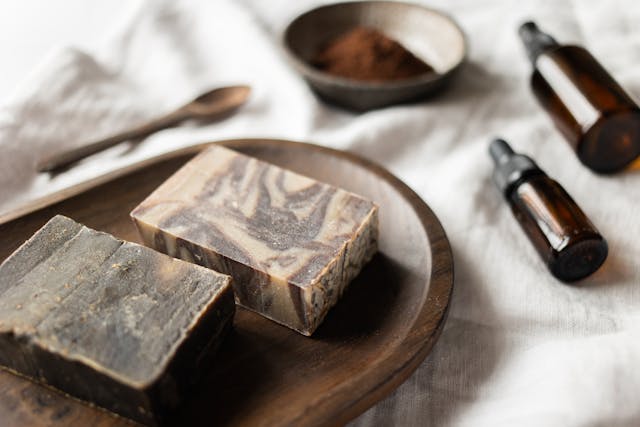
2. Vegan Ingredients
Team Vegan prefers beauty products that do not contain any animal ingredients or by-products. Vegan ingredients used in products are sustainably sourced from non-animal-derived substances.
It’s said that vegan cosmetics are cruelty-free since they do not contain substances such as animal-derived glycerine, beeswax, honey, keratin, lanolin, collagen, or elastin.
So, what are the ingredients used in vegan beauty products?
- Plant-based Oils: Vegan beauty products mainly utilise plant-based oils such as coconut oils, almond oil and jojoba oil. These natural ingredients are great for nourishing the skin and hair.
- Essential Oils: Vegan beauty products also include essential oils due to their therapeutic abilities. Essential oils used in vegan cosmetics include rosemary, tea tree, and lavender oil.
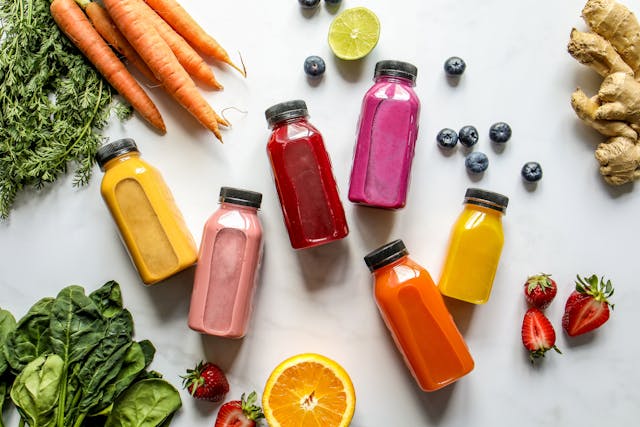
3. Brands Making Vegan Beauty Products According to PETA (People for the Ethical Treatment of Animals)
Vegans are strict in their principle not to patronise brands that use animal-derived ingredients. According to PETA, the number of vegan beauty brands has been on the rise as the demand for sustainability increases.12
ESW Beauty
EWS Beauty focuses on vegans with their Vanilla Oat Milk Nourishing Plant-Based Milk Mask and Pineapple Bliss Revitalising Raw Juice Mask.
“Sustainability is a priority for this beauty brand,” says PETA. They make their face masks compostable and their packaging is recyclable, further emphasising their commitment to sustainability, according to PETA
Ferver
Fever is another brand offering vegan beauty products. This skincare brand utilises the process of fermentation, which the company claims helps break down active ingredients, making them comfortable and easy for the skin to absorb.
According to PETA, the company’s line includes a vegan collagen serum, moisturising cream, cleansers and more.
MDSolarSciences
MDSolarSciences, according to PETA, is a skincare company that focuses on making products to protect your skin from harmful UV rays.
4. Eco-Packaging (Recyclable, Reusable, and Refillable Packaging)
It’s not surprising that the beauty industry generates about 120 billion units of packaging per year, making it a major contributor to the global waste problem. The sustainability trend has also led to the adoption of eco-packaging, through which the beauty industry aims to minimise its waste generation.

Lush
Lush is a brand making an effort to reduce waste generation in the cosmetic industry. According to an article published on CNN Underscored, the brand’s signature black pots are made from 100% post-consumer recycled plastics.
Lush’s black pots can be reused at home or returned to the store for recycling as part of the brand’s green initiative to reduce the large amount of waste generated by the cosmetic industry.
The brand also has a program to reward customers who return clean, empty pots to their stores. Customers will receive $1 off their next purchase for returning an empty, clean pot and a free face mask when they return five empty pots.
Susanne Kaufman
In a move to prioritise sustainability, Susanne Kaufmann launched a 100% recyclable refill bottle for three of the company’s cleansing products: Hand Soap, Hair & Body Wash, and Purifying Cleansing Gel.
According to the brand’s founder, Susanne Kaufmann, “Each recyclable refill not only helps reduce waste to landfill but also cuts carbon emissions by 69%. Our recyclable refills meet the demand of conscious consumers while sharing the responsibility to protect our planet.”
Sustainable Packaging and Ingredients in Beauty Products
Eco-packaging prioritises environmental sustainability. It ensures that the material used in the production line for packaging meets sustainability standards for waste reduction in the beauty industry.13
Cosmetic products come in various material types—from recyclable plastics to paper. Product packaging with paper materials is considered the most sustainable since paper can be recycled many times.
Recyclable plastics used by various beauty brands for packaging are considered a better option, but some consumers disagree with the idea of plastic packaging being a sustainable choice.
Other durable materials can be used in product packaging—bamboo, for example, is gaining popularity due to its ability to replenish naturally and to completely biodegrade at the end of its life.
Sustainable Ingredients
Natural and biodegradable ingredients are sustainably sourced and used in the production of cosmetics to minimise the industry’s carbon footprint.
- Natural Cosmetics: These are products formulated with natural ingredients like plants, animal products, and minerals. These ingredients can be sourced from organic or conventional farming practices. While natural products are preferred for their beneficial properties, natural cosmetics may contain organic and non-organic components.
- Organic Cosmetics: Organic cosmetics are made with ingredients from plants that are free from synthetic pesticides, fertilisers and genetically modified organisms (GMOs). These ingredients are grown and harvested organically. “100% organic,” “organic”, or “made with organic” are often used to indicate different levels of organic content in a cosmetic product.14
- Vegan Cosmetics: Vegan cosmetics are products without any animal-derived ingredients or by-products. These cosmetic products are cruelty-free and have never been tested on animals.
Zero-Waste Personal Care Routines
Consumer preference can influence the beauty industry and brands to align themselves with the new trend. Decisions on product selection should focus on brands that take the sustainability trend seriously to meet consumers’ demands.
1. Opt for Brands that Care about the Environment
Brands must recognise their responsibility and show genuine commitment to achieving sustainability in the cosmetic industry. One brand demonstrating this commitment is the American personal care brand, Dove.
According to the brand, they have switched to 100% recycled plastic bottles and plastic-free packs for their Beauty Bar. By doing so, they have minimised the rate of virgin plastics used by more than 20,500 tons each year.15
The brand also stated that they are committed to reducing their production waste to zero.
2. Refill and Reuse
Being eco-conscious means prioritising waste reduction strategies. Look for beauty products that provide a refill option. Reuse or repurpose empty bottles whenever possible.
If you can’t reuse or repurpose empty bottles at home, try returning them to the brand’s store for recycling or recycling them yourself.
Consider Eco-packaging
Look for logos that indicate whether a product’s packaging is sustainably designed. Check if the packaging is made from recycled plastics and whether the material can be recycled.
Opt for beauty products in sustainable packaging materials like paper, glass or bamboo.
Frequently Asked Questions
What are the sustainable practices in the beauty industry?
Beauty brands are increasingly adopting sustainable practices, from implementing eco-friendly production processes and using sustainable packaging to minimise waste, to developing cruelty-free formulations and utilising natural ingredients.
How can waste be minimised in the beauty industry?
Minimising waste in the beauty industry involves advocating for change, ensuring proper recycling, using sustainable packaging, and committing to waste reduction through the use of recyclable materials.
Conclusion
The beauty industry has grown significantly, influencing and exciting more consumers than ever with new products. The ever-evolving global cosmetic industry is now worth hundreds of billions of dollars, and the international market demand for trendy and sustainable products has become increasingly prevalent.
Brands must recognise their responsibility and demonstrate a genuine commitment to achieving sustainability in the cosmetic industry.
Sources
- Sasounian, R., Martinez, R. M., Lopes, A. M., Giarolla, J., Rosado, C., Magalhães, W. V., Velasco, M. V. R., & Baby, A. R. (2024). Innovative Approaches to an Eco-Friendly Cosmetic Industry: A review of Sustainable ingredients. Clean Technologies, 6(1), 176–198 ↩︎
- Deboshree Barman Seal et al: “CONSTITUENTS AFFECTING BRAND LOYALTY OF SUSTAINABLE BEAUTY AND PERSONAL CARE PRODUCTS.” ↩︎
- Kim, Y., Lee, J., Lee, S., & Lee, H. (2021). Developing sustainable Competitive Strategies in the beauty service Industry: a SWOT-AHP approach. Sustainability, 13(19), 10852. ↩︎
- Dube, M., & Dube, S. (2023). Towards sustainable colour cosmetics packaging. Cosmetics, 10(5), 139. ↩︎
- Environmental impact of the cosmetic industry. (n.d.). ResearchGate. ↩︎
- Cherney, K. (2019, June 7). 10 benefits of using aloe vera on your face. Healthline. ↩︎
- Watson, K. (2023, June 22). Shea Butter for your face: Benefits and uses. Healthline. ↩︎
- Watson, K. (2019, March 8). What is shea butter? 22 reasons to add it to your routine. Healthline. ↩︎
- Rd, R. a. M. (2023, May 12). Is coconut oil good for your skin? Healthline. ↩︎
- How to use tea tree oil for skin. (2019, September 18). ↩︎
- TEA TREE OIL: Overview, uses, side effects, precautions, interactions, dosing and reviews. (n.d.). ↩︎
- Vegan beauty brands to help you look and feel good | PETA. (2024, April 2). PETA. ↩︎
- Dorotea Kovačević et al: “Design of Sustainable Packaging for Natural Cosmetics.” ↩︎
- Dini, I. (2024). “Edible Beauty”: the evolution of environmentally friendly cosmetics and packaging. Antioxidants, 13(6), 742. ↩︎
- Author, D. (2023, December 6). How to make your skincare routine zero waste | Dove. Dove. ↩︎



